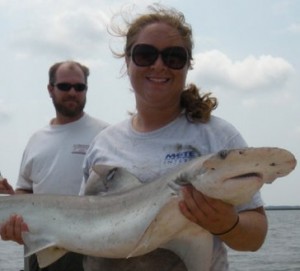
Bonnethead sharks have always occupied a special place in my heart (and in the photo of myself that I use for Southern Fried Science). These animals, a member of the hammerhead family, are some of the most abundant sharks along the coast of the Southeastern United States. While the IUCN Shark Specialist Group rates bonnetheads as “Least Concern”, the assessment noted that these sharks are subjected to heavy commercial and recreational fishing pressure.
For that reason, studying their life history is one of the South Carolina Department of Natural Resources (SCDNR) coastal shark survey’s research priorities. “Having this information allows SCDNR and the National Marine Fisheries Service to properly manage these animals,” said Bryan Frazier, chief scientist for the SCDNR shark survey.

As part of his long-term study, Bryan recently made a fascinating discovery. One of the bonnethead sharks captured by the shark survey had an old tag in it’s dorsal fin. When he looked up the tag number in the SCDNR database, Bryan found that not only had he been present when the shark was originally tagged in 2002, but he had captured the same animal again in 2005.
This would be an exciting discovery by itself, but this bonnethead was already a full-grown adult when it was caught in 2002. In fact, in 9 years “at liberty”, it only grew 3 centimeters! Before Bryan aged this shark, the previous oldest direct-aged member of this species was only 7.5 years old (with an estimated maximum age of 12 based on recapture data). This animal was determined to be 17 years old, making it by far the world’s oldest known bonnethead shark. This amazing find adds to Bryan’s records – he also discovered the world’s oldest known Atlantic sharpnose shark (16 years) and the world’s oldest known blacknose shark (21 years ).
These finds have important implications for the management of coastal shark species. An important factor in the stock assessment process is the “maximum observed age”. Bryan’s discoveries raise the maximum observed age of these species, which could have significant impacts on their estimated fecundity (how many offspring they have). Bonnetheads reproduce every year after they become mature at age 4, and if they live for 5 years longer than earlier management plans considered, an individual female can have many more pups in her lifetime than previously believed.
Even with a species as commonly encountered as the bonnethead shark, there are lots of exciting discoveries to be made. The ocean never ceases to amaze!
Nice job Bryan! But still doesn’t beat my 48 year old great hammerhead. 🙂
I don’t know a lot about “maximum observed age,” but it seems foolish to take such a thing into account when determining the fecundity of an entire species. Humans can live to 120, but the average red neck dies exactly 3 seconds after saying, “hey ya’ll, watch this.”